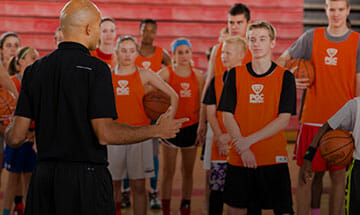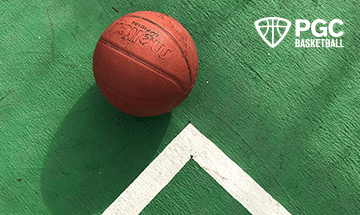How to Coach Your Teammates
If you want to instruct in a way that is really going to help your basketball team, you need to instruct before the bad thing happens, before the play takes place. Then the teammate you instruct will take your instruction as encouragement and as a reminder, and he will be grateful to you after the play instead of irritated.
In basketball, this opportunity—or failure—happens frequently. A star player is dribbling down the court, suddenly he stops and shoots and scores, and the defender’s teammate yells:
“Hey, don’t let him shoot. He’s killing us!” Such criticism stings.
Read More: The Most Important Decision You Can Make as a Basketball Player
No doubt, when the dribbler approached, the defender was worried about the shot but also worried that the dribbler would race by him for an easy layup. Instruction during that worry time would have been very welcome. It would have been helpful for the defender to hear his teammate say:
“Don’t let him shoot. If he tries to pass you, I’ll pick him up.”
Huge difference. Now it’s a team thing, not an individual thing. A teammate has offered to share responsibility directly. And you can be sure, nine times out of ten if good basketball players are out there, the dribbler won’t be permitted to stop and get off a good shot. The defender will force him to go toward the basket where another teammate is waiting to help. That kind of instruction isn’t just welcome, it builds teamwork even when the play fails.
Say the dribbler does manage to pass the defender, pass both defenders, and score. Usually a joint “I’m sorry” or “my fault” follows, and the two players determine not to let it happen again.
A certain pact is formed on a play like that, and good things happen psychologically as a result. Naturally, if the defensive play works and the dribbler goes by and is picked up by the helping teammate, the two players develop a sense of trust and a good feeling. Their play becomes more efficient, better. They work together to accomplish the objectives both of them recognize. Two heads are better than one. When two people work together to accomplish something that would have been more difficult, or impossible, individually, something special happens. Teamwork. Chemistry. Excellence.
“But,” you’re saying, you “can’t always instruct before the event takes place. Sometimes it happens too fast. There isn’t time.” And my reply would be, “You need not always instruct.” Remember, you are an athlete. That’s your role. You are not the coach. So, you don’t need to instruct full time, every time. You need to instruct only when instructing proves to be a good thing for an athlete to do. The coach will usually do more than enough instructing anyway.
On most teams there’s no shortage of instruction, there’s a shortage of proper execution. Therefore, adding more instruction particularly when a teammate already feels like a failure and is angry or upset, just isn’t the way to build a champion.
In the example above, had the teammate told the defender in advance not to allow the shot, but the defender allowed it anyway, the intelligence of the instruction would have rung loud and clear and nothing would have had to be added after the shot went through the rim.
If you are not smart enough to anticipate the need or not quick-thinking enough to yell the instruction in advance, my feeling is you don’t have a right to say anything.
There are exceptions to nearly every rule, of course, so no use belaboring the point. You may find some intelligent way occasionally to offer instruction after the fact, but the before-or-not-at-all rule is a good one to keep in mind. Most after-the-play instruction is usually nothing more than voiced frustration or anger. It really isn’t instruction at all. If you aren’t able to instruct a teammate before something happens, you probably aren’t the person who ought to be doing any instructing.
—Excerpted from the book, “Think Like a Champion”
Related Articles
5 Ways Any Basketball Player Can Earn More Playing Time
Want more playing time? Stop asking for it and start earning it. These five habits separate players coaches trust from players who stay stuck on the bench.
5 Ways to Practice Mental Toughness
Here are five ways to practice your mental toughness off the court. If you practice these five things, every day, you’ll develop greater self-discipline. You’ll become unstoppable in anything you do. It is five things you will have to rise above your feelings every day. That is how you build mental toughness. You develop, as a habit, a muscle of rising above your feelings to level of your aspirations and commitments.
The Beauty of the Game | The Leadership Podcast
Mano joins Jan Rutherford & Jim Vaselopulos, on The Leadership Podcast to talk about his sports and business experiences with stories and advice on thinking like a coach, communicating, and making a difference in people’s lives.
About PGC
PGC Basketball provides intense, no-nonsense basketball training for players and coaches. Our basketball camps are designed to teach players of all positions to play smart basketball, be coaches on the court, and be leaders in practices, games and in everyday life.
We combine our unique PGC culture with a variety of teaching methods and learning environments to maximize the learning potential of those that attend our sessions. In addition to spending 6-7 hours on the court each day, lessons will be reinforced through classroom sessions and video analysis.
Our goal at PGC is to empower you with the tools to fulfill your basketball dreams, while also assisting you in experiencing the joy of the journey.
To learn more about PGC Basketball, including additional basketball training tips and videos, visit our YouTube Channel or find us on Facebook, Instagram, and Twitter.





Share This Post